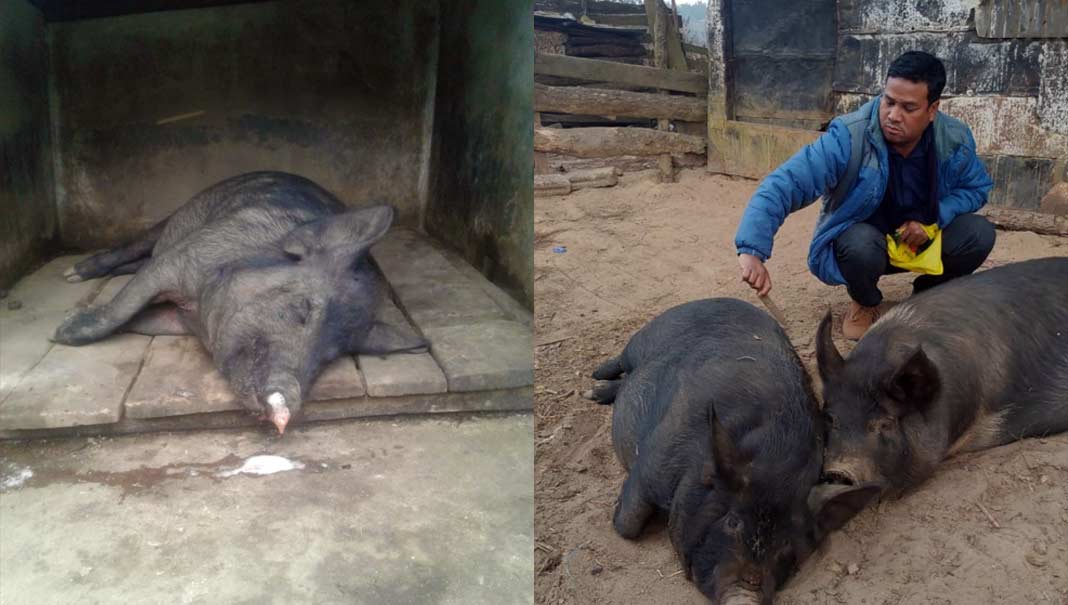19 epicentres of African Swine Fever notified in Meghalaya
Principal Secretary of the Animal Husbandry & Veterinary department, Dr Shakil P Ahamed in a notification issued on Thursday said that based on the test result of pig samples dated 17.08.2020 received from ICAR-National Institute of High Security Animal Diseases (NIHSAD), Bhopal and confirmation of African Swine Fever outbreak in Meghalaya by the Department of Animal Husbandry and Dairying, Government of India, New Delhi vide letter dated 24th August 2020 and also based on test results received from the North Eastern Regional Disease Diagnostic Laboratory (NERDDL) Guwahati, vide letter No. AHC-107/NERDDL/ASF/Test Result/2020-21/626, dated 11th August 2020 and letter No. AHC-107/NERDDL/ASF/Test Result/2020-21/637, dated 14th August 2020.
In view to prevent, control and eradicate the scheduled disease, in exercise of the power conferred under the Section 6 and Section 20 of the Prevention and Control of Infectious and Contagious Diseases in Animals Act, 2009 (hereinafter referred to as the ‘Act’) the Governor of Meghalaya is pleased to declare the villages listed below as ‘epicentres’ of African Swine Fever disease, as under:-
| Sl. No | Name of Village | Name of the Block | District |
| 1 | Lamin | Amlarem Block | West Jaintia Hills |
| 2 | Shangpung Moosyiem | Laskein Block | -do- |
| 3 | Shnongpdeng | Amlarem Block | -do- |
| 4 | Nongtalang | -do- | -do- |
| 5 | Khlieh Umtrew | Umsning Block | Ri-Bhoi |
| 6 | Umnget | -do- | -do- |
| 7 | Mawlyngkhung | -do- | -do- |
| 8 | Umsaitsning Umdamli | -do- | -do- |
| 9 | Nongrim Nongladew | Bhoirymbong Block | -do- |
| 10 | Umkdait, Nongmensong | Mawpat Block | East Khasi Hills |
| 11 | Mawlai Mawdatbaki | Mawlai Block | -do- |
| 12 | Mawshbuit Nongrim | Mawryngkneng Block | -do- |
| 13 | Mawshbuit Nongkhlaw | -do- | -do- |
| 14 | Sohlwai, Krang | Sohiong Block | -do- |
| 15 | Mylliem Madaningsyiem Lumbangla | Mylliem Block | -do- |
| 16 | 5th Mile, Parmaw, Upper Shillong | Mylliem Block | -do- |
| 17 | Synrang Shahkhain, Rymbai | Khliehriat Block | East Jaintia Hills |
| 18 | Wapungskur | -do- | -do- |
| 19 | Government Pig farm Mairang | Mairang Block | West Khasi Hills |
As per the National Action Plan for control, containment and eradication of African Swine Fever prepared by the Ministry of Fisheries, Animal Husbandry and Dairying, Government of India, the restrictions as mentioned hereunder are applicable with immediate effect in the villages under 1 (one) kilometre radius surrounding infected premises(epicentre of disease) designated as “Infected Zone” and in all villages falling under 10 KM radius surrounding infected premises(epicentre of disease) designated as “Surveillance Zone”.
Restrictions in the Infected Zone
- No live pigs or pig feed or pork and pork products shall be allowed to be taken out of or brought into the infected zone.
- There should not be any movement of pig associated supplies (veterinary medicine, feed equipment, breeding tool etc.) from Infected Zone.
- All equipments/supplies associated with pig should not be moved out of the pig sheds/pig farms.
- The pig farm owners and pig handlers shall maintain hygiene and bio-security in pig farms and restrict entry of people into farm premises.
- There shall be restriction of movement of people to the infected premises.
- There shall be complete prohibition of movement of pig handlers from one pig shed to another.
- Vehicles shall be allowed to move out of the infected zone only after cleaning and disinfection.
- If pigs are swill-fed, the source of the swill feed should be traced for identification of other possible contact premises.
- No person is allowed to take out any pig alive or dead which is infected or suspected to be infected from African swine fever.
- No person is allowed to take out any pig feed or bedding materials or other materials namely carcass, skin or other parts or products of such animals which has come in contact with any animal infected or suspected to be infected from African swine fever.
- The carcasses shall not be allowed to move out of the infected premises and shall be disposed in the infected premises itself.
- In case of exception where the carcass disposal is not possible, the transport of carcasses should be undertaken by the agencies under control of District Veterinary office following strict biosecurity protocols and using leak proof vehicle.
- Carcasses should be disposed of by deep burial with sufficient lime cover only and not to be thrown in rivers/streams/water bodies.
- After the carcasses have been disposed of, the premises and any potentially contaminated vehicle and equipment shall be cleaned and disinfected under supervision of Veterinary Officers/Rapid Response Team (RRT).
- Preliminary disinfection of infected premises should be carried out under direction and supervision of Veterinary Officers/Rapid Response Team (RRT).
- Secondary disinfection shall be carried out by owner in accordance with direction of Veterinary Officers/Rapid Response Team (RRT).
- Contaminated feed, slurry, swill, bedding, farm waste products, litter in infected premises shall be disposed of by deep burial.
- There shall be complete ban on slaughter of pigs and sale of pork and pork products in Infected Zone.
- Swill feeding (kitchen and restaurant waste) of pigs is prohibited.
- Pig markets and abattoirs in infected zone should strictly be closed down.
- The District Veterinary Officer and RRT shall take steps locally to ensure that everyone in and around infected zone is made aware of the restrictions and requirements in force there.
- Local institutions such as Municipalities, village Dorbars, Dolloi, Headmen, Nokmas etc, shall assist the Veterinary Officers/RRT in discharge of their duties and take necessary measures to prevent the outbreak or spread of disease as provided under Section 30 of the Act.
- Whoever places or causes or permits to be placed in any river, lake, canal or any other water body the carcass or any part of the carcass of any animal which at the time of death was known to be infected with ASF, shall be guilty of any offence and on conviction, be punished in the cases of a first offence with fine of two thousands rupees or with imprisonment of one month in case of non-payment of fine and in case of subsequent conviction with a fine of five thousands rupees or imprisonment for a term which may extend to three months or with both as provided under Section 33 of the Act.
- Under Section 40 of the Act every Competent Officer, Director, Animal Husbandry & Veterinary Department and Veterinary Officer while exercising any power or performing any duty under the said Act shall be deemed to be public servant within the meaning of Section 21 of the Indian Penal Code.
Restrictions in the Surveillance zone
- Movement of live pigs from surveillance zone to infected zone is prohibited.
- Movement of pigs within the surveillance zone is permitted.
- There shall be complete ban on inter-state and inter-district movement of pigs.
- All equipments/supplies associated with pigs in infected zone should not be brought to the surveillance zone.
- Carcasses should be disposed of by deep burial with sufficient lime cover only and not to throw in rivers/streams/water bodies.
- Movement of manure, slurry and other pig wastes is not permitted although it can be licensed for transport for disposal.
- The pig farm owners and pig handlers shall maintain hygiene and bio-security in pig farms and shall restrict entry of people into farm premises.
- There shall be complete prohibition of movement of pig handlers from one pig shed to another.
- Trucks and vehicles that have carried live pigs or other livestock or material which may be contaminated with ASF are prohibited from leaving premises of the surveillance zone unless undergone cleaning and disinfection.
- Swill feeding (kitchen and restaurant waste) of pigs is prohibited.
- Waste from slaughter houses and pork stalls has to be disposed of properly by deep burial.
- Movement of pork and pork products from surveillance zone to free zone is prohibited.
- No animal gathering in surveillance zone is allowed to have pigs present.
- Clinical surveillance for suspected sign/illness/death suggestive of ASF and sample collection shall be done.
- The Divisional Forest Officer, Wildlife Division shall control and manage wild boars in forest area surrounding infected zone and surveillance zone.
Preventive measures in Free Zone (area outside the surveillance zone)
The following measures shall be enforced in Free Zone where ASF is not present to prevent entry of these diseases, as under:-
- The pig farm owners and pig handlers shall maintain hygiene and bio-security in pig farms and shall restrict entry of people into farm premises.
- Avoid contacts and ensure cleaning and disinfection at control points (such as entry to farm and between sheds ), restrict movement of vehicle on/off farm and control the disposal and collection of fallen stock and other waste.
- Pig holders shall be advised to confine their pigs.
- There shall be no movement of pigs, meat and feed from infected zones and surveillance zones into the Free zones.
- Entry of pork meat and pork products from other zones into Free Zone is prohibited.
- It is prohibited to feed meat to pig (from slaughter or kitchen waste)
- Swill feeding (kitchen and restaurant waste) of pigs is prohibited.
- Pig owners shall take preventive measures to prevent transmission of disease from wild boars, scavenging and stray pigs.
- Monitoring the health of pigs for symptoms of the disease and follow regular management practices like deworming etc.
- Surveillance for ASF shall be carried out to provide assurance of continued disease freedom in the area.


Leave a Reply